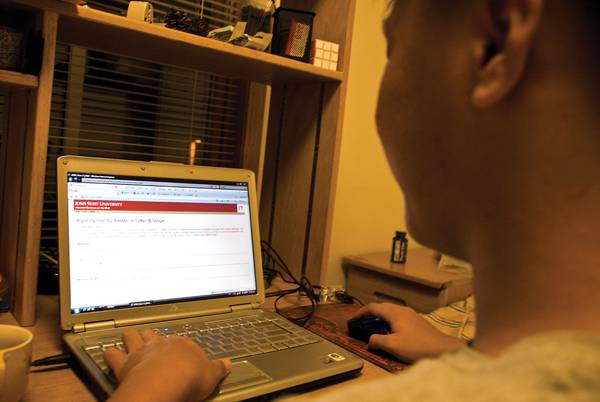CyMail transition has been smooth, officials say

A student migrates his e-mail from Webmail to the new Cymail, August 24, 2009. Photo: Karuna Ang/ Iowa State Daily
August 30, 2009
Students appeared to have few difficulties making the change from the university-managed WebMail to CyMail, the newly-acquired, Google-run e-mail service.
“We’ve received almost no complaints,” said Jim Davis, vice provost for IT Services and chief information officer. “We really couldn’t imagine it going any better.”
Iowa State aimed to save resources and money with the transition to the new system, yet the change also addressed students’ growing needs for access to a variety of online tools.
“The main incentive was the level of service Google provides for the students,” Davis said. “With collaborative tools like calendars and Google Documents, students will be able to communicate on group projects much better than with WebMail.”
However, some students expressed concern about their privacy when outsourcing through a third party such as Google. Jim Twetten, assistant director of IT Services, said using Google should not be a source of nervousness.
“In this day, outsourcing is a given. It’s just part of the process,” Twetten said. “Since they’re a large corporation giving similar services to so many other schools, they have excellent security measures that match up well with ISU.”
The contract between Google and Iowa State specifies that the first term of service will be four years. After that, Iowa State can choose to end the service or renew the contract, although there is a possibility of additional charges.
While CyMail is now available to students, it will not be available to ISU faculty and staff. According to a recent IT Services press release regarding the switch, faculty cannot use the new system due to “federal laws covering export control regulations and privacy standards required by FERPA.” This ensures the exchange of e-mail between students and professors is kept private and does not travel through a public source.
FERPA is the Family Educational Rights and Privacy Act, which is a federal law that “protects the privacy of student education records,” according to the U.S. Department of Education Web site.
Iowa State is one of many schools following in the footsteps of Arizona State University, which switched to Google in October 2006. It was one of the first large universities to make this transition, according to the Arizona State University Web site.
The switch for Iowa State was made official when the Government of the Student Body voted in favor of it on Dec. 3, 2008.
GSB considered using other mail services, such as Windows Live, before settling on Gmail. In the end, they decided that “Windows Live, while perhaps having more features, is less user-friendly because the features are scattered and require multiple downloads,” according to the minutes from the Dec. 3 meeting.
“WebMail was getting outdated, and it was time for something new,” said James Parrott, director of information technology for GSB and senior in engineering. “GSB recommended Gmail, and it seemed to be the best option.”
In general, students have an apathetic view toward the switch.
“I have a Gmail account, but I don’t really use it that much. I’m not really excited about it or against it, and everyone else seems to be pretty neutral,” said Tyler Lubben, senior in English.
“WebMail was really flawed, and as long I can keep all the old messages I need in the new system, I really don’t have any strong opinion about the switch,” said Evan Rickels, junior in mechanical engineering. “As long as the process is smooth, it doesn’t really matter to me.”






